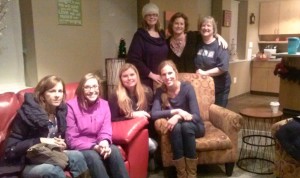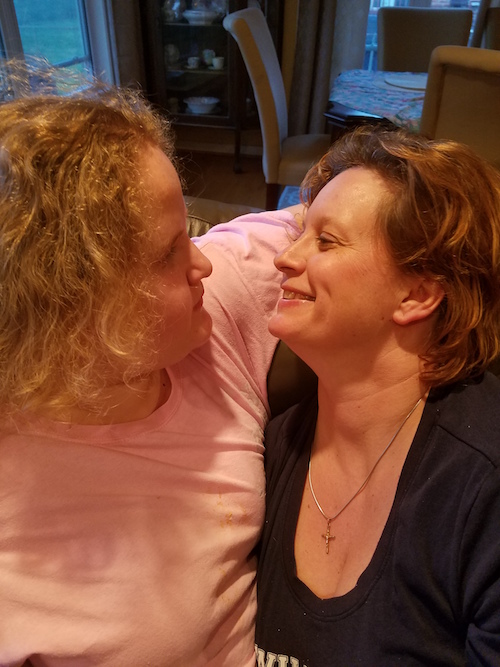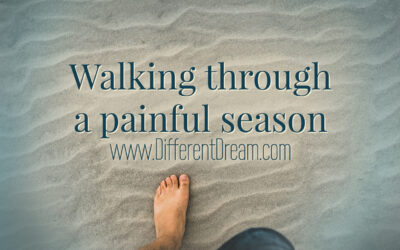How To Find Special Needs Parenting Support, Part 1

Different Dream is pleased to once again welcome guest blogger Karen Jackson. She’s here with the first of 2 posts about how to find special needs parenting support.
How To Find Special Needs Parenting Support, Part 1
I think I may have become an expert at finding personal special needs parenting support. Not because that has been my goal over the past 18 years as a mom to a child with special needs, but just because I seem to need more support than any one person or group can give! From professionals and family to friends and acquaintances from many different areas of my life, my support system is expansive. The following is a non-clinical, definitely unresearched list developed out of my own experience as a mom to a child with a disability. I am hopeful that it may help another parent in my situation, or it may just be a thoughtful exercise for an experienced special needs parent to examine the support they have or have not received thus far on their unique journey.
#1: Special Needs Parenting Support Groups
I strongly believe in support groups. They bring people together who are experiencing similar life events and give them an opportunity to share in an informal settin g. I couldn’t find the kind of Christian support group I was seeking when my daughter was young so I decided to start my own at my church. Although I no longer facilitate in the group, I still attend and enjoy the laughing, the crying and the fellowship of my Living in Holland Christian Support Group at another small church in Norfolk, VA. Even though we only meet monthly, the friendships I have developed with others who share a similar parenting journey are strong and important to me. It is a blessing to get the opportunity to talk with other moms who understand the challenges of raising a child with a disability.
g. I couldn’t find the kind of Christian support group I was seeking when my daughter was young so I decided to start my own at my church. Although I no longer facilitate in the group, I still attend and enjoy the laughing, the crying and the fellowship of my Living in Holland Christian Support Group at another small church in Norfolk, VA. Even though we only meet monthly, the friendships I have developed with others who share a similar parenting journey are strong and important to me. It is a blessing to get the opportunity to talk with other moms who understand the challenges of raising a child with a disability.
#2: Co-Workers
For years only a select few at my school where I teach music knew much about my home life. I actually preferred it this way because I wanted an escape. I desired a place that my identity was not as a mom to a daughter with special needs, but as a professional music educator. I, of course, shared some of my personal life with colleagues and administration but overall most people did not know the extreme challenges I faced at home. I certainly did not share about my daughter and autism with parents of my students; in all honesty, I did not think they would understand.
That began to change as I began to advocate in my own church. I offered to share at my school and gave a few disability awareness talks for the students but most people still did not fully comprehend what my home life was like as caregiver for a child on the spectrum.
Last year I published a book entitled, Loving Samantha and for the first time, other parents at my school learned about my daughter and some of the personal challenges we face. And a surprising thing happened-they offered and continue to offer their support and encouragement with kind words and practical help in times of crisis.
Recently, I found myself in the ER with Samantha and had no food at dinner time, not even a package of crackers in my purse! I called a friend, a parent at my school who lives near the hospital and asked if she could please bring me some kind of food. I could not leave Samantha’s side, even for a few minutes and I was starving. She arrived with a Panera Bread bag in hand, hugs and words of comfort. What a blessing and one I would have missed had I not been willing to cross that barrier and share with people related to my work.
#3: Friends
Most of us moms have developed friends along the parenting journey. I am blessed with many including a circle of very close women friends. These ladies have been there to listen to me, to pray and even help when things get complicated trying to manage all of my kids. They are strong women of faith and I can’t imagine life without them. Some are moms who have similar parenting journeys but not all. I try to be there for them, too, with love, prayer support and encouragement.
#4: Family
Yes, it is tough topic sometimes. Family can be more a source of challenges rather than support, I know. But what I have learned is that it is important to find out the best way they are comfortable supporting me and ask for help in that area. Whether it be coming to visit (or not), praying, financial support or anything else, extended family can be a source of strong encouragement with some careful cultivating and prayerful insight.
My immediate family (husband and three children) are of course, supportive as well. My husband and I try hard to share responsibilities, although since he works a lot, most of the home caregiving falls to me. We have worked hard to understand each other’s roles in the family though and am happy to report we will have been married 23 years this summer.
My boys are extremely caring and supportive too. They ha ve learned, as siblings of a person who has a significant disability, to step in and help when things get tough with unexpected medical issues for their sister or challenging behaviors.
ve learned, as siblings of a person who has a significant disability, to step in and help when things get tough with unexpected medical issues for their sister or challenging behaviors.
How Do You Find Special Needs Parenting Support?
Do you have a special needs parenting support group? We’d love to hear how it came to be. Leave a comment!
Do you like what you see at DifferentDream.com? You can receive more great content by subscribing to the monthly Different Dream newsletter and signing up for the daily RSS feed delivered to your email.

By Karen Jackson
Karen Jackson is the Executive Director of Faith Inclusion Network of Hampton Roads where she lives with her husband and three children in Norfolk, VA. She is also the author of the recently published book, Loving Samantha.
1 Comment
Submit a Comment
Subscribe for Updates from Jolene
Related Posts
Why Did God Make Me this Way?
Guest blogger Steve Siler tells the story of his answer to his son’s question: “Why did God make me this way?”
Can Churches Help Families Raising Children with Disabilities Stay Together?
Can churches help families raising children with disabilities stay together? Guest blogger Mark Arnold explains his opinion.
The Physical Manifestations of Grief in Caregivers
Jolene explains how the heaviness of loss and sorrow can contribute to the physical manifestations of grief in caregivers.






Well done. We are working to produce a new software package foe caregivers to Assess their top needs and then find support for eac area. We will also have articles and videos on special topics.